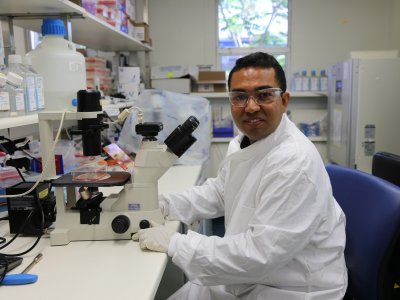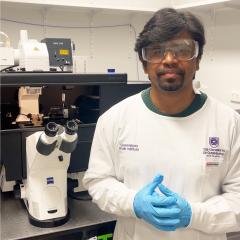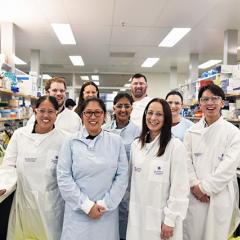 A University of Queensland research team will investigate the potential of repurposing an existing blood pressure drug to slow or halt the progression of Parkinson’s disease.
A University of Queensland research team will investigate the potential of repurposing an existing blood pressure drug to slow or halt the progression of Parkinson’s disease.
The Michael J. Fox Foundation for Parkinson’s Research and its major Australian funding partner, Shake It Up Australia Foundation, are funding the research project to explore using the drug to treat Parkinson’s disease in preclinical models.
The project’s chief investigator, Dr Richard Gordon of UQ’s School of Biomedical Sciences, said the research would evaluate if forms of the drug could block brain inflammation associated with the progression of Parkinson’s disease.
“There is accumulating evidence that patients develop chronic immune activation and brain inflammation due to the buildup of insoluble protein clumps called ‘Lewy bodies’ in Parkinson’s,” Dr Gordon said.
“By halting the inflammation cycle, the drug could act as a potential therapeutic to halt or slow disease progression.”
There is no cure for Parkinson’s disease, which affects 70,000 Australians and 5 million people worldwide.
Shake It Up Australia founder Clyde Campbell said the project could make a real difference in the lives of people living with Parkinson’s disease.
“Inflammation of the brain has been a key area of research, and we are excited to be involved in exploring the potential of this drug to provide tangible benefits in slowing or halting the disease progression.”
The drug has been prescribed for high blood pressure in a number of countries since the 1990s and has a good safety record for long-term use.
UQ’s Associate Professor Trent Woodruff said the project could enable a rapid translation of the drug to the clinic.
“It is already approved for use in humans, and so a lot of the preclinical barriers can be bypassed, allowing for a more rapid path to testing in patients.”
The research team includes Dr John O’Sullivan at UQ’s School of Medicine and the Royal Brisbane & Women’s Hospital, and Dr Kate Schroder and Professor Matt Cooper at the UQ Institute for Molecular Bioscience.
The UQ team was awarded $139,000 through The Michael J. Fox Foundation’s Target Advancement funding program.
Media: Dr Richard Gordon, r.gordon1@uq.edu.au, +61 7 33652384; Bernadette O’Connor, bernadette.oconnor@uq.edu.au, +61 7 3365 5118, 0431 533 209.



